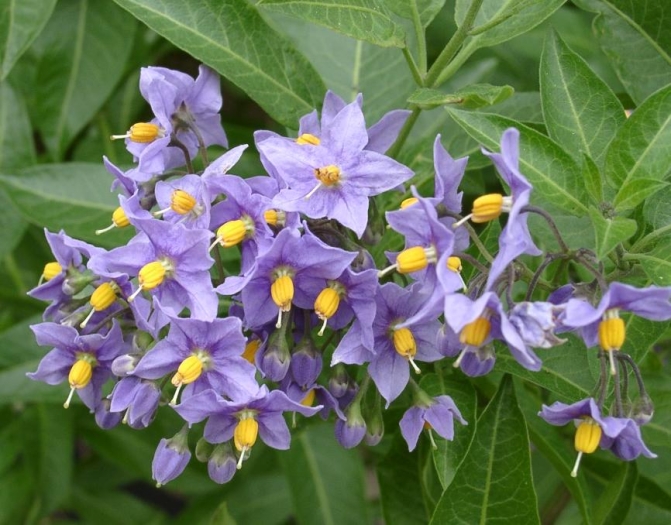Chilean Nightshade
(Solanum crispum)
Chilean Nightshade (Solanum crispum)
/
/

The Ramin Nakisa Wikipedia.
CC BY-SA 3.0
Image By:
The Ramin Nakisa Wikipedia.
Recorded By:
Copyright:
CC BY-SA 3.0
Copyright Notice:
Photo by: The Ramin Nakisa Wikipedia. | License Type: CC BY-SA 3.0 | License URL: http://creativecommons.org/licenses/by-sa/3.0/ | Uploader: Taragui | Publisher: Wikimedia Commons | Title: SolanumCrispum.jpg | Notes: User created page with UploadWizard |




























Estimated Native Range
Summary
Solanum crispum, commonly known as Chilean Nightshade, is an evergreen perennial vine originally from the temperate rainforests of Chile and adjacent regions of Peru, where it thrives in the understory and along forest margins. It typically reaches a height of 6-12 feet and a width of 3-6 feet, with a vigorous climbing habit that can cover structures or form dense thickets. The plant features dark green, glossy leaves and produces clusters of small, star-shaped flowers with vibrant blue or purple petals and prominent yellow stamens, blooming profusely from spring through fall, adding long-lasting color to the garden.
Chilean Nightshade is valued for its extended flowering period and the ornamental quality of its blooms, which attract pollinators. It is suitable for trellises, walls, and fences in urban and residential settings, and can be used to create a quick screen. While it prefers neutral to slightly alkaline soils, it is adaptable to various soil types, provided they are moist and well-drained. It requires some protection from frost and may need support to climb effectively. The plant’s berries transition from green to yellow-orange to purple as they mature and are toxic if ingested. Gardeners should be aware of its potential to spread and manage growth accordingly to prevent unwanted naturalization.CC BY-SA 4.0
Chilean Nightshade is valued for its extended flowering period and the ornamental quality of its blooms, which attract pollinators. It is suitable for trellises, walls, and fences in urban and residential settings, and can be used to create a quick screen. While it prefers neutral to slightly alkaline soils, it is adaptable to various soil types, provided they are moist and well-drained. It requires some protection from frost and may need support to climb effectively. The plant’s berries transition from green to yellow-orange to purple as they mature and are toxic if ingested. Gardeners should be aware of its potential to spread and manage growth accordingly to prevent unwanted naturalization.CC BY-SA 4.0
Plant Description
- Plant Type: Vine
- Height: 6-12 feet
- Width: 3-6 feet
- Growth Rate: Moderate
- Flower Color: Blue, Purple
- Flowering Season: Spring, Summer, Fall
- Leaf Retention: Evergreen
Growth Requirements
- Sun: Full Sun, Part Shade
- Water: Medium
- Drainage: Medium, Fast
Common Uses
Bee Garden, Bird Garden, Border Plant, Butterfly Garden, Deer Resistant, Drought Tolerant, Fragrant, Hummingbird Garden, Rabbit Resistant, Showy Flowers
Natural Habitat
Temperate rainforests of Chile and adjacent regions of Peru
Other Names
Common Names: Chilean Potato Vine, Potato Vine, Chilean Potato-Tree, Nightshade
Scientific Names: , Solanum crispum, Solanum tomatillo, Solanum ligustrinum, Solanum gayanum, Solanum congestiflorum, Solanum crispum var. elaeagnifolium, Solanum crispum var. ligustrinum, Solanum pyrrhocarpum, Solanum subenervium
GBIF Accepted Name: Solanum crispum Ruiz & Pav.